Hesperian Health Guides
COVID-19: Vaccines
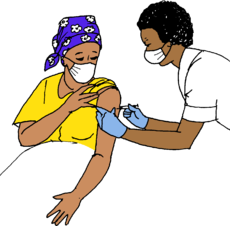
The vaccines use several methods to make your body recognize the COVID-19 virus and then build protection (“antibodies”) to fight it. The vaccine is usually injected into muscle (the upper arm is often easiest). If another dose is needed to fully protect you, depending on the vaccine, that should occur 3 to 12 weeks later.
None of the vaccines can make you sick with COVID-19.
Contents
- 1 Vaccines are safe and effective
- 2 The COVID-19 vaccines were developed so fast, how do we know they are safe?
- 3 How do the vaccines work? Do they make you sick? Do they change your DNA?
- 4 How do we know side effects or problems won’t develop later?
- 5 My community has been hit hard by COVID-19 but some people do not want to get vaccinated. How can I encourage them?
- 6 Who should get the COVID-19 Vaccine?
- 7 What happens after I get the vaccine?
- 8 Inequality and the pandemic
Vaccines are safe and effective
Vaccines work. You and many people you know have been safely vaccinated against many illnesses. Because of vaccines, some illnesses that used to harm or even kill people, such as polio and smallpox, are now rare or have disappeared completely.
The COVID-19 vaccines were developed so fast, how do we know they are safe?
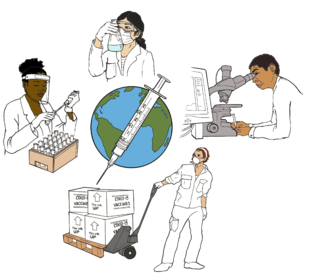
All vaccines are tested to make sure the vaccine is not harmful, find the best dose, make sure there are no serious side effects, and make sure it is effective. The COVID-19 vaccines have been tested by more than 250,000 people in many different countries — people of different ethnicities, with various existing illnesses, and of a wide range of ages. After many months, almost no health problems were reported from any of the new vaccines. That’s why the COVID-19 vaccines were approved quickly. The vaccines now have been used by millions of people around the world with very few serious side effects reported.
Much of the research to develop these vaccines was done before the COVID-19 epidemic began. Outbreaks of other coronaviruses in 2002 (SARS) and 2012 (MERS) drove the development of new vaccines and vaccine technologies to stop them. This and other research worldwide quickened the development of the COVID-19 vaccines.
How do the vaccines work? Do they make you sick? Do they change your DNA?
There are more than 70 COVID-19 vaccines being developed or already in use, but they all work by training the body to recognize the virus and make antibodies to fight it.
- The inactivated virus vaccines use a form of the COVID-19 virus that cannot make you sick but still trains your body to fight it. (Sinopharm, SinoVac, others)
- The viral vector vaccines use only a piece from the outside of the virus (called the “spike protein”), but that’s enough for the body to recognize the virus and learn to fight it. (Johnson & Johnson, Sputnik V, AstraZeneca, others)
- The recombinant protein vaccines use a mix of tiny protein pieces from the spike. (Novavax)
- The messenger RNA (mRNA) vaccines give cells instructions on how to make the spike protein which then causes the body to start making antibodies to fight it. The mRNA does not enter the part of your cells where the genes or DNA are, so it cannot alter your DNA. In fact, the mRNA is so fragile that after it delivers its instructions it quickly disintegrates. (Moderna, Pfizer, others)
Like other viruses, the COVID-19 virus is changing (mutating) which means different versions (variants) of COVID-19 are spreading in different regions. Many of the vaccines work against the variants of the virus. But for some variants, the vaccines will have to be modified to work better, much as the influenza (flu) vaccine is changed each year.
How do we know side effects or problems won’t develop later?
The common side effects of the COVID-19 vaccines are redness, swelling or pain where you were injected, headache, joint or muscle pain, tiredness, or a low fever (which means that your body is making antibodies as it should). It is normal for some people to feel uncomfortable or unwell for 1 or 2 days and for others to have no side effects at all. Side effects may be stronger after the second injection. Less than one in a million people have had more serious side effects with the vaccines, such as blood clots. Because the number of people affected is so small, not getting vaccinated and getting COVID-19 is much more dangerous than getting the vaccine.
It is extremely rare to have an allergic reaction to the COVID-19 vaccine. But you may be asked to wait after your vaccination for 15 to 30 minutes in case you need treatment for an allergic reaction.
Decades of experience of introducing new vaccines show that any problems that develop usually happen in the first 2 months after using them. Almost none have been found with the COVID-19 vaccines.
My community has been hit hard by COVID-19 but some people do not want to get vaccinated. How can I encourage them?
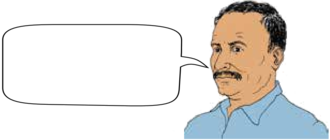
People have many reasons to not want to get vaccinated. Past mistreatment, including experiences of discrimination by the health system or distrust of the government, provides plenty of reasons to be suspicious. And when news and social media are filled with conflicting messages, it allows people to find “proof” for almost any idea. Because COVID-19 most harms those who have fewer resources, more health problems, and live and work in crowded conditions, it is even more important for people facing higher risks to get accurate information and to get vaccinated.
- Listen, validate and assure. Listening and responding to people’s experiences with health issues, and particularly what they are concerned about with the COVID-19 vaccines, can allow you to explain what is true and not true while also acknowledging their concerns and past experiences.
- Speak with your actions. Get vaccinated and encourage other community leaders to do so.
- Point out people in your country or other places who were vaccinated to show that they have not gotten sick and COVID-19 cases are now fewer.
- Explain that even though they may be young and strong, getting vaccinated will lessen the chances that their family, friends and coworkers will get sick.
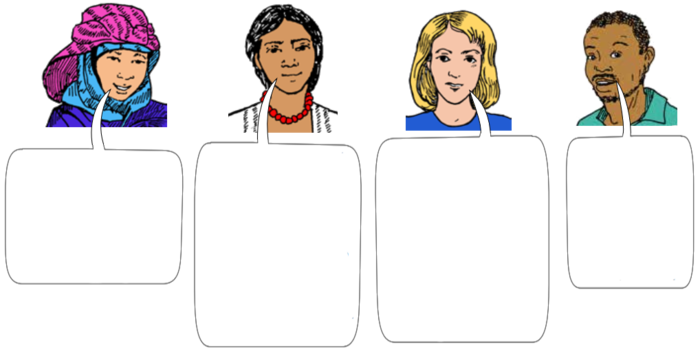
Who should get the COVID-19 Vaccine?
Everyone should get the COVID-19 vaccine. When there is not enough vaccine for everyone, it makes sense to give the vaccine first to the groups of people most at risk of getting sick:
- health workers who care for or spend time with people sick from COVID-19
- workers whose jobs bring them into contact with many people every day, especially if they also live in crowded conditions
- elders, who are more likely than younger people to develop a severe case of COVID-19
- people who have illnesses or disabilities such as heart, kidney or lung disease, diabetes, obesity, Down Syndrome, and others
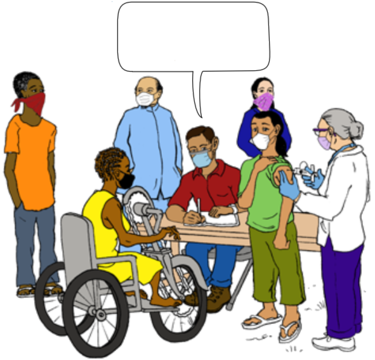
Research continues on how the COVID-19 vaccine affects younger children, but it is safe for those who are 12 years and older. Regarding pregnancy, it is more dangerous to have COVID while pregnant than it is to get vaccinated.
If a person has already had COVID-19, they should still get vaccinated but should wait until 3 months after they got infected.
What happens after I get the vaccine?
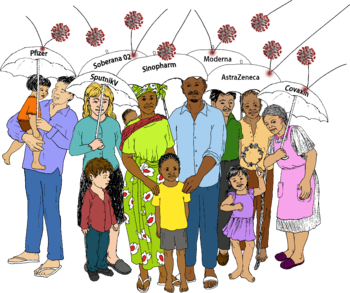
After the vaccination, your body begins to build protection, and about two weeks after the final vaccination your protection will be strongest, making you fully vaccinated. You will no longer be made seriously sick by COVID-19.
If everyone in a group is fully vaccinated, then they no longer need to wear masks or take the other precautions while together. And fully vaccinated people can safely be with an unvaccinated but healthy individual or household without precautions.
But until most people in a community have been fully vaccinated, COVID-19 will continue to spread and cause illness. Especially when spending time with older people, people in poor health, or people with chronic conditions such as diabetes, breathing problems, etc., everyone should still take the precautions that prevent the spread of COVID-19: wear a mask, wash hands often, avoid being indoors with people you do not live with, and keep a distance of 2 meters (6 feet) or so from others.
Inequality and the pandemic
COVID-19 has highlighted the terrible inequality among people and nations worldwide. The quarantines put in place to stop the spread of the virus have affected people differently depending on how they make a living, where they live, and their access to resources. People are going hungry, losing jobs and income, being thrown out of housing, being denied needed medicines, and suffering from depression and other strains on mental health. To address these problems, many people and groups have come together to help one another and to demand support from local and national governments.
That same inequality is happening internationally with vaccine access. Wealthy countries are buying up the vaccines while governments of poorer countries are at the end of the line to get their populations vaccinated. This means the suffering and poverty caused by the pandemic will last much longer in those countries. A fair response to COVID-19 demands:
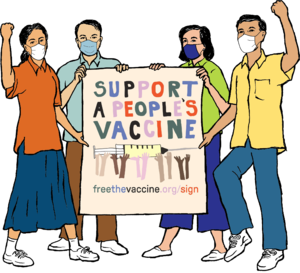
- equal access to COVID-19 vaccines for all countries, regardless of ability to pay.
- pharmaceutical companies must transfer the technology so vaccines can be made regionally where they are needed.
- the World Trade Organization must recognize the COVID-19 pandemic as an emergency and waive the Agreement on TRIPS (Trade-Related Aspects of International Property Rights) so that countries can produce the vaccine themselves.


